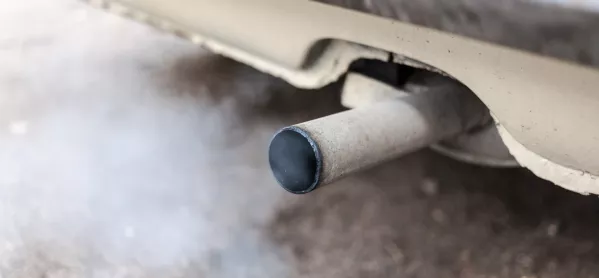Cars should be banned from idling near schools in a bid to cut pollution, say health experts.
In a new report, Public Health England (PHE) calls for a raft of measures to ease the effects of pollution, including stopping cars idling near school gates, promoting car-pool lanes and providing priority parking for electric cars.
It is also urges a “step change” in the uptake of low-emission vehicles by setting more ambitious targets for electric car charging points, and says air pollution is the biggest environmental threat to health in the UK, with between 28,000 and 36,000 deaths a year attributed to long-term exposure.
Quick read: Pupils exposed to pollution on ‘toxic’ school runs
Quick read: ‘It’s “crazy” to build schools in polluted areas’
Experts also want to see cleaner public transport and more foot and cycle paths to improve health.
Professor Paul Cosford, director for health protection and medical director of PHE, told BBC Radio 4‘s Today programme: “The technologies are available - the things that we need to do, we know about. So this is a matter of how we take this issue as seriously as we need to and how we move the technologies and the planning and all of that into reality so we actually deal with this problem for us and for future generations.”
Car pollution at the school gates
Asked about a proposal to ban cars from the school run, he said: “I do think that if we consider this to be an issue of future generations, for our children, let’s have a generation of children brought up free from the scourge and the harms of air pollution.
“And that does then take you to: ‘What can we do about making sure schools are at least as clean as possible?’
“We should stop idling outside schools, we should make sure that children can walk or cycle to school, and we should make sure that schools work with their parents about how they can do their best for this.”
Calling for a culture change, he said: “If we were having a conversation about 30,000 people dying each year because of a polluted water supply, I think we would have a very different conversation. It would be about, ‘What do we need to do now and how quickly can we do it?’”
The report also calls for cities to be redesigned to offer protection from roads, with the creation of wider streets and the use of hedges to screen against pollutants.
Edmund King, president of the AA motoring organisation, said: “The one action that could improve air quality overnight is to target the 10 per cent of gross polluting vehicles that cause 50 per cent of the problem. These tend to older lorries, buses or badly-serviced cars.
“The school run is an easy target but, in our experience, the best school travel plans are those drawn up by the pupils themselves rather than through legislation.
“Some of the proposals in this report, though well-meaning, are somewhat simplistic, such as the promotion of car-pool lanes which really don’t work in the UK.”




